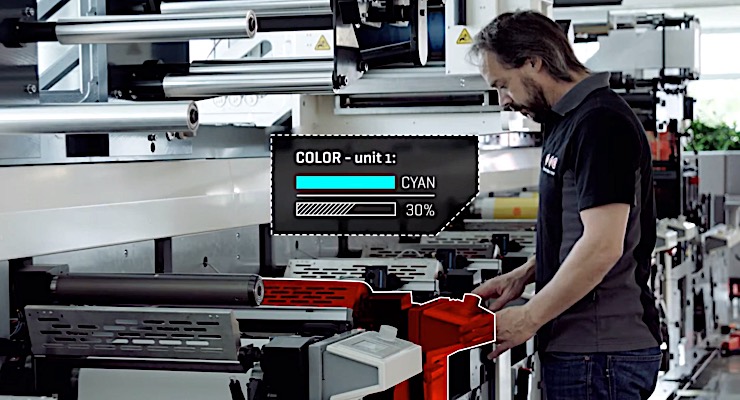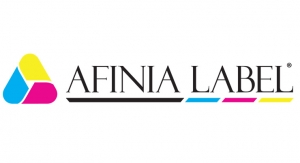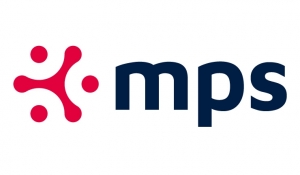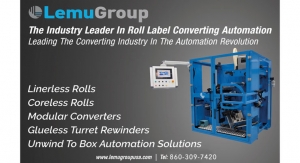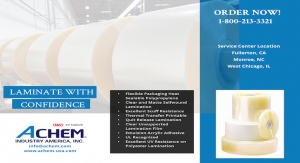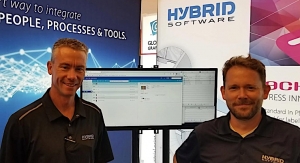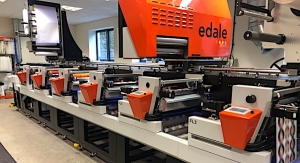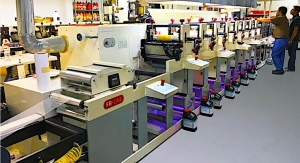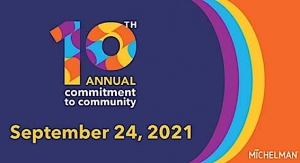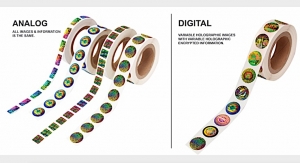Greg Hrinya, Editor03.08.21
MPS Systems, a specialist in flexo presses for the narrow web marketplace, has been hard at work in developing the next wave of technologies for the future. Today, this equipment must meet a host of requirements for current operators and those that have yet to enter the workforce. They must be faster, smarter, and in many ways – go “Beyond the Machine.”
In addition to new flexo and hybrid presses, MPS has engineered its “talk to me” protocol to further the exchange of data through multiple channels. The company has also developed high-speed matrix rewind, automated and dynamic print control, non-stop print changeovers and more, which promote an increase in press speeds, reducing and optimizing downtime and empowering machine operators.
MPS’ range of presses – the EFS, EFA, EF-SYMJET and EXL lines – are focused on connectivity, productivity, service and applications to meet its customers’ needs. The company has also embraced hybrid label printing, which leverages its flexo expertise in combination with that of Domino’s digital inkjet know-how.
“We believe hybrid printing technology will be the technology of the future,” explains Michael Weyermann, vice president of sales and marketing, MPS Systems North America. “Though conventional presses are here to stay, we will continue to improve the technology, speed, and productivity of these machines to rival the advantages of digital presses. We believe digital assets will get wider and faster, making way for this technology into other segments like flexible packaging. Converters want the best of both technologies – the speed and quality of flexographic printing with the flexibility and versatility of digital inkjet – and hybrid presses are the solution.”
The EF SYMJET powered by Domino is that hybrid flexo inkjet press that gives converters a range of new print potential with the combination of conventional and digital printing technologies. The EF SYMJET press is built with the standard MPS EF platform and an integrated Domino digital N610i inkjet printer. With a Domino digital inkjet unit integrated on the EFS or EFA flexo platform, converters get the best of both worlds together in a future-proof press.
The increase in short runs and need for personalization and variable data printing has placed an increased emphasis on digital printing. Manufacturers like MPS have responded to meet this market need.
“The rise in digital printing continues to motivate us at MPS to engineer better, faster, quicker flexo press technologies,” says Weyermann. “Inspired by digital technology, MPS has created flexo solutions that support quicker changeovers, automation, and connectivity. To have a press that can recall print parameters in job memory, automate print and registration settings, store and present important data metrics to management, and get up and printing as fast as a digital changeover is what we strive for. Also, the increase in digital has sparked the production of flexo-digital hybrid technologies, as well. The EF-SYMJET powered by Domino is MPS’s hybrid press solution that combines the advantages of conventional print with the versatility and flexibility of digital inkjet – all in a single pass.”
MPS has tailored its portfolio to accommodate the varying needs of the modern label printer. Whether looking for a flexo, hybrid or digital printing press, there are a number of considerations to keep in mind. According to Weyermann, converters must evaluate for quality, speed and performance of each press. Of course, the press must also be able to meet their unique job requirements.
“Another consideration is the connectivity options provided by the OEM,” notes Weyermann. “Having a press that provides real time data to not only your management and production staff, but your OEM’s service team, can dramatically decrease downtime and optimize maintenance. Also, complete an audit of your order mix, staff and fleet – are there any gaps or opportunities for growth? Understanding your most profitable opportunities, your current fleet challenges, and the capabilities of your staff are important when choosing the best press and auxiliary equipment for success.”
Flexibility also must go beyond the equipment. In today’s challenging atmosphere, manufacturers and converters alike must adjust to better serve their customers. For MPS, that has translated to virtual press demonstrations, remote service calls and operator trainings, while also adapting quickly to a digital workspace.
The COVID-19 pandemic has brought about certain challenges, but MPS has responded – and its technological capabilities have played a role. “For new press installs and necessary service visits, we used local engineers from agents and customers, when available, to reduce travel exposure to the virus,” says Weyermann. “Customers with “talk to me” connectivity deployed on their machine had the added advantage of digital visibility into their machine data, which helped with remote service, job planning and informed decision making during these critical times.”
To learn more about MPS and flexo presses in the label and packaging industry, click here for an in-depth feature.
In addition to new flexo and hybrid presses, MPS has engineered its “talk to me” protocol to further the exchange of data through multiple channels. The company has also developed high-speed matrix rewind, automated and dynamic print control, non-stop print changeovers and more, which promote an increase in press speeds, reducing and optimizing downtime and empowering machine operators.
MPS’ range of presses – the EFS, EFA, EF-SYMJET and EXL lines – are focused on connectivity, productivity, service and applications to meet its customers’ needs. The company has also embraced hybrid label printing, which leverages its flexo expertise in combination with that of Domino’s digital inkjet know-how.
“We believe hybrid printing technology will be the technology of the future,” explains Michael Weyermann, vice president of sales and marketing, MPS Systems North America. “Though conventional presses are here to stay, we will continue to improve the technology, speed, and productivity of these machines to rival the advantages of digital presses. We believe digital assets will get wider and faster, making way for this technology into other segments like flexible packaging. Converters want the best of both technologies – the speed and quality of flexographic printing with the flexibility and versatility of digital inkjet – and hybrid presses are the solution.”
The EF SYMJET powered by Domino is that hybrid flexo inkjet press that gives converters a range of new print potential with the combination of conventional and digital printing technologies. The EF SYMJET press is built with the standard MPS EF platform and an integrated Domino digital N610i inkjet printer. With a Domino digital inkjet unit integrated on the EFS or EFA flexo platform, converters get the best of both worlds together in a future-proof press.
The increase in short runs and need for personalization and variable data printing has placed an increased emphasis on digital printing. Manufacturers like MPS have responded to meet this market need.
“The rise in digital printing continues to motivate us at MPS to engineer better, faster, quicker flexo press technologies,” says Weyermann. “Inspired by digital technology, MPS has created flexo solutions that support quicker changeovers, automation, and connectivity. To have a press that can recall print parameters in job memory, automate print and registration settings, store and present important data metrics to management, and get up and printing as fast as a digital changeover is what we strive for. Also, the increase in digital has sparked the production of flexo-digital hybrid technologies, as well. The EF-SYMJET powered by Domino is MPS’s hybrid press solution that combines the advantages of conventional print with the versatility and flexibility of digital inkjet – all in a single pass.”
MPS has tailored its portfolio to accommodate the varying needs of the modern label printer. Whether looking for a flexo, hybrid or digital printing press, there are a number of considerations to keep in mind. According to Weyermann, converters must evaluate for quality, speed and performance of each press. Of course, the press must also be able to meet their unique job requirements.
“Another consideration is the connectivity options provided by the OEM,” notes Weyermann. “Having a press that provides real time data to not only your management and production staff, but your OEM’s service team, can dramatically decrease downtime and optimize maintenance. Also, complete an audit of your order mix, staff and fleet – are there any gaps or opportunities for growth? Understanding your most profitable opportunities, your current fleet challenges, and the capabilities of your staff are important when choosing the best press and auxiliary equipment for success.”
Flexibility also must go beyond the equipment. In today’s challenging atmosphere, manufacturers and converters alike must adjust to better serve their customers. For MPS, that has translated to virtual press demonstrations, remote service calls and operator trainings, while also adapting quickly to a digital workspace.
The COVID-19 pandemic has brought about certain challenges, but MPS has responded – and its technological capabilities have played a role. “For new press installs and necessary service visits, we used local engineers from agents and customers, when available, to reduce travel exposure to the virus,” says Weyermann. “Customers with “talk to me” connectivity deployed on their machine had the added advantage of digital visibility into their machine data, which helped with remote service, job planning and informed decision making during these critical times.”
To learn more about MPS and flexo presses in the label and packaging industry, click here for an in-depth feature.

